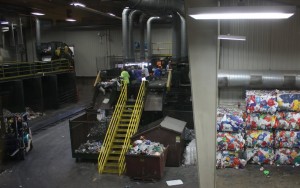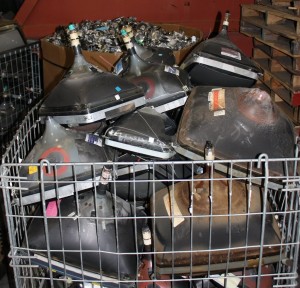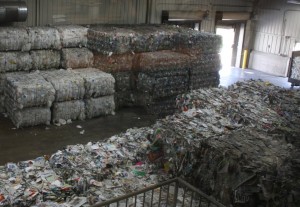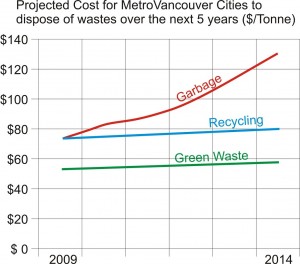At work, I’m an environmental coordinator; as a volunteer, I help run a grassroots environmental non-profit. On vacation: I tour recycling plants in far-off locales.
OK, it might have been a one-off. An old friend I was visiting in Illinois happened to be teaching and Environmental Science course, and invited me to tag along on a field trip she had organized for her class. The destination was the Scott Area Recycling Centre and associated Electronic Demanufacturing Facility:
Scott County and the City of Davenport, Iowa, are trying to reduce the amount of waste going to landfill (for all the environmental and economic reasons one would expect), and their curbside blue box materials come here. In Davenport, they do “commingled” recycling, and this facility is where the waste is separated and compressed for shipping to whoever will buy the recycled materials. They receive mixed paper, newsprint, plastics #1 and #2, and metal and glass containers. There are a series of magnets, air-blown density sorters and other equipment, but the majority of the actual sort is done by hand.
The results? A County-wide diversion rate approaching 25%. This is good compared to no diversion at all, and adds to the lifespan of the local landfill, but pales in comparison to areas with aggressive diversion targets, such as Metro Vancouver (Currently 55%, aiming for 70%). Scott County is not aiming for a specific number when it comes to diversion, only “continuous improvement”. Still, for semi-rural Iowa, any diversion is a success.
One interesting difference between here and there is tipping fees, what garbage collecting companies or municipalities pay to dump materials at the recycling yard and the landfill. At the Scott County landfill, mixed household waste is $24/Tonne. At the recycling centre, it is $23/Tonne. I’m sure the small difference is significant to large-scale waste collectors, but compare the numbers in MetroVancouver : $82/Tonne for mixed garbage, $59/Tonne for “Green Waste” that can be made into compost. Before you think this is another example of the Government Screwing you becasue you are Canadian, the tipping fee does not reflect the $130/Tonne it costs to manage Vancouver’s waste. The fact our recycling programs generate a modest profit creates the incentive that has led to our >50% diversion rate. and the reason we are aiming to improve it:
I don’t think that suggesting regional governments make decisions based on economics, and the sound fiscal management of the Taxpayer’s assets is “cynical”. I would think it is “responsible”. We don’t divert because it is the right thing to do, we do it because we simply cannot afford not to.
More later on how Scott County manages e- waste, and the death of the CRT display.
waste, and the death of the CRT display.

